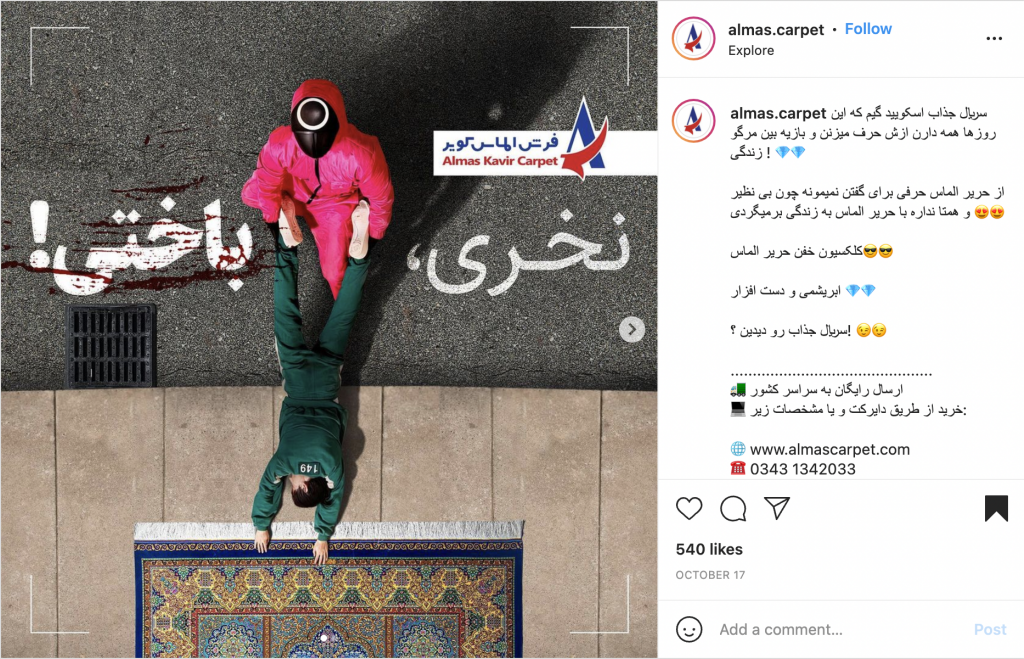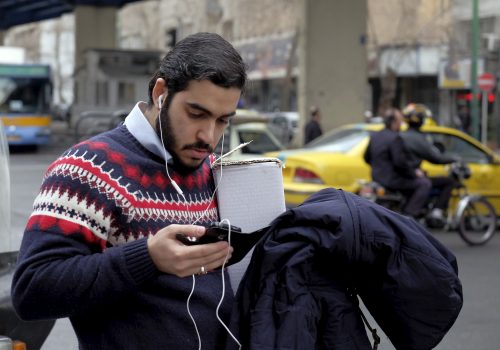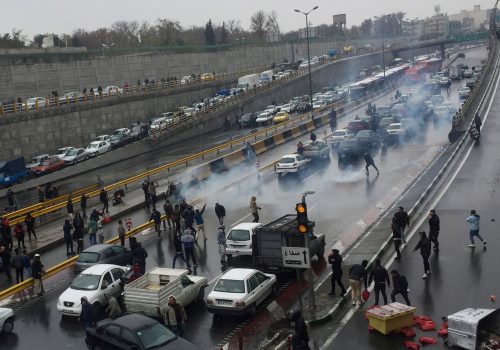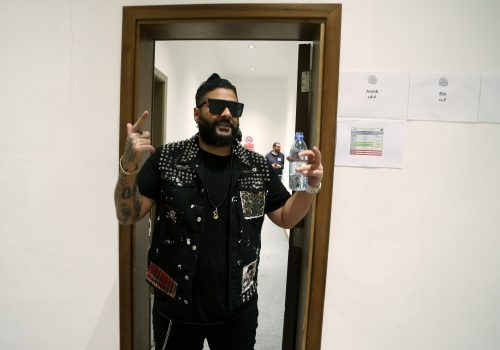October 27, 2021
Iranians give ‘Squid Game’ the green light
To sell their Persian carpets, an Iranian company thought it would be a good idea to drag a dead body across one of them. It was a unique, albeit rather disturbing, approach. This wasn’t just any dead body: it was Player 149 from the South Korean hit drama series, Squid Game.
With Squid Game becoming a global phenomenon, it’s no surprise that it’s also gaining popularity in Iran. Many Iranians have been watching bootleg versions of the hit show, and the country’s version of Netflix plans to air it dubbed in Persian soon. But the Iranian fascination with Squid Game comes at a time when Iran and South Korea are having their own drama.

Iran used to be South Korea’s third-largest Middle East trading partner. These longstanding economic ties were severely disrupted after the Donald Trump administration withdrew from the 2015 Iran nuclear agreement and re-imposed sanctions in May 2018. South Korean technology giants LG and Samsung, which had dominated the Iranian home-appliance market, left in November 2018. According to the Iranian embassy in Seoul, trade between the two countries, which amounted to $12 billion in 2017, dropped by half in 2018 and plunged to a mere $111 million in the first six months of 2020.
The drama
South Korea stopped importing Iranian oil in May 2019 and South Korean banks froze $7 billion in Iranian assets from the prior sale of crude oil and gas condensate to abide by US sanctions. This money has become a thorn in relations between the countries, whose ties have historically been so close that they both have streets named after each other in their respective capitals.
In January, Iran seized a South Korean-flagged chemical tanker in the Strait of Hormuz, citing alleged environmental violations. It quickly became apparent that the Hankuk Chemi and its captain were being held hostage by Iran in the hopes of getting its funds unfrozen. In late February, Seoul agreed to release $1 billion as an “initial step,” which was reportedly to be sent through a US-approved Swiss humanitarian channel, so that Tehran could buy medical equipment and vaccines to combat COVID-19. Two months later, in early April, the tanker and its captain were freed. South Korea’s Prime Minister Chung Sye-kyun visited Iran days later to discuss the Iran nuclear accord and frozen assets.
At the time of the visit, state broadcaster Islamic Republic of Iran Broadcasting (IRIB) aired “Side by Side,” a documentary on alleged misconduct and violations by South Korean brands. While Prime Minister Sye-kyun was in Tehran, the Iranian deputy general prosecutor said LG and Samsung had “abandoned the Iranian people in harsh conditions” and that the country wouldn’t allow them to continue to operate in Iran.
Months later, Iran enforced that decision. On September 28, Supreme Leader Ayatollah Ali Khamenei ordered President Ebrahim Raisi to “firmly block” South Korean home appliance companies from exporting to Iran. Without naming LG and Samsung, Khamenei noted that two companies “will break the back of domestic manufacturers, which have just started to stand on their own feet.”
Frozen assets and home appliance companies aren’t the only sources of tension between the two countries. US sanctions have also complicated things for Iranian students studying in South Korea. In early October, South Korea’s Education Ministry informed Iranian scholarship students via email that they wouldn’t be receiving their monthly stipends, as its government had blocked their bank accounts. Upon receiving the email, one Iranian student wrote on Twitter: “My heart is beating all over the place…We left that ruined place [Iran] and now we can’t relax still??????”
The k-wave
Long before the “Korean wave” washed up on America’s shores, it had inundated Iran. In a call with his South Korean counterpart on October 7, Iranian Foreign Minister Hossein Amirabdollian said: “I told him that our kids at home watch Korean shows and ask us if these kind Koreans are the same ones that don’t give us our money back?”
Amirabdollian wasn’t talking about Squid Game but an array of historical period k-dramas airing on IRIB. In 2009, Iranians were so hooked on the series, Jumong and Dae Jang Geum (Jewel in the Palace), that LG invited actor Song Il-kook the star of Jumong to visit Iran, where he was bombarded by fans asking for autographs.
Now that Iranians have turned their attention to Squid Game, some businesses on Instagram have gotten into the craze by superimposing their company logos on dalgona, a Korean candy. There are even tutorials by influencers on how to make the toffee-like wafer. Countless Persian language memes referencing the k-drama are flooding Instagram accounts and Telegram channels, alongside ones dedicated to k-pop bands BTS and Blackpink. State media outlets have endlessly covered the series and its international impact and there are also Squid Game-themed mobile games. Even a satirical diaspora cartoon series reimagines the basij, an Iranian paramilitary force, going to South Korea to get the frozen assets only to end up in Squid Game, which they refuse to play until it’s “Islamicized” with separate spaces for men and women.
Squid Game speaks to a broader audience through its message about the woes of capitalism and the vast inequalities between elites and ordinary people—something to which many Iranians can relate. Many struggle to get by in an economy depressed by mismanagement, corruption, and US sanctions, with a national currency that has lost more than 70 percent of its value since 2018.
In the past year alone, the number of Iranians below the official poverty line has increased by 40 percent, according to government statistics. Many can’t afford basic food staples with inflation skyrocketing to at least 45 percent—the highest since 1994. Meanwhile, the upper echelons of the Islamic Republic and their cronies continue to get richer. A reported 250,000 dollar millionaires live in Iran amid the pandemic and punitive economic sanctions.
Some Iranians have even likened the violence in Squid Game and the rule of the Front Man to the Islamic Republic and its Supreme Leader. They draw comparisons to when security forces brutally cracked down on protesters during the November 2019 anti-establishment protests that led to the killing and arrests of thousands.
Iran is at a red light, with many people feeling that they are innocent victims of circumstances outside their control and that the only winners are regime elites.
Holly Dagres is editor of the Atlantic Council’s IranSource blog, and a nonresident senior fellow with the Middle East Programs. She also curates The Iranist newsletter. Follow her on Twitter: @hdagres.
Further reading
Tue, Mar 30, 2021
An Iranian cleric, rights activist, and hacker entered a room—on Clubhouse
IranSource By Holly Dagres
It sounds like the beginning of a joke but in reality, that’s what happened recently in a Clubhouse chatroom discussing whether or not the hijab should remain mandatory in Iran.
Fri, Nov 13, 2020
A year after the November protests, human rights violators have not been held accountable in Iran
IranSource By Gissou Nia
Ideally, justice would be served by the Iranian leadership investigating violations and punishing perpetrators within their ranks. Unfortunately, that is not a realistic scenario.
Fri, Mar 12, 2021
This Iranian pop song is “more dangerous than polio”
IranSource By Holly Dagres
In the days following the release of the 'Tehran Tokyo' teaser, Iranian politicians and conservatives called for the video to be censored because they claimed that it presented pornography to children.
Image: South Korean actor Song Il Gook, star of "Jumong," at a press conference in Iran during 2009 (Wikimedia Commons)


